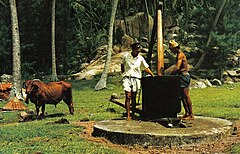“The article contains Coconut Oil Production: Dry and Wet Process, RBD (refined, bleached, and deodorized), Hydrogenation, Fractionation”
Coconut oil
Solidified “coconut butter” sold by a Norwegian company
Coconut oil is an edible oil extracted from the kernel or meat of matured coconuts harvested from the coconut palm (Cocos nucifera). It has various applications in food, medicine, and industry. Because of its high saturated fat content it is slow to oxidize and, thus, resistant to rancidification, lasting up to two years without spoiling.[1]
Many health organizations advise against the consumption of high amounts of coconut oil due to its high levels of saturated fat.
Production
Dry process

Traditional way of making coconut oil using an ox-powered mill
Coconut oil can be extracted through “dry” or “wet” processing. Dry processing requires the meat to be extracted from the shell and dried using fire, sunlight, or kilns to create copra.[10] The copra is pressed or dissolved with solvents, producing the coconut oil and a high-protein, high-fiber mash. The mash is of poor quality for human consumption and is instead fed to ruminants; there is no process to extract protein from the mash. A portion of the oil extracted from copra is lost to the process of extraction.
Wet process
The all-wet process uses raw coconut rather than dried copra, and the protein in the coconut creates an emulsion of oil and water.[11] The more problematic step is breaking up the emulsion to recover the oil. This used to be done by prolonged boiling, but this produces a discolored oil and is not economical; modern techniques use centrifuges and pre-treatments including cold, heat, acids, salts, enzymes, electrolysis, shock waves, or some combination of them. Despite numerous variations and technologies, wet processing is less viable than dry processing due to a 10–15% lower yield, even compared to the losses due to spoilage and pests with dry processing. Wet processes also require investment of equipment and energy, incurring high capital and operating costs.[12]
Proper harvesting of the coconut (the age of a coconut can be 2 to 20 months when picked) makes a significant difference in the efficacy of the oil-making process. Copra made from immature nuts is more difficult to work with and produces an inferior product with lower yields.[13]
Conventional coconut oil production uses hexane as a solvent to extract up to 10% more oil than just using rotary mills and expellers. The oil is then refined to remove certain free fatty acids, in order to reduce susceptibility to rancidification. Other processes to increase shelf life include using copra with a moisture content below 6%, keeping the moisture content of the oil below 0.2%, heating the oil to 130–150 °C (266–302 °F) and adding salt or citric acid.[14]
Virgin coconut oil (VCO) can be produced from fresh coconut meat, milk, or residue. Producing it from the fresh meat involves removing the shell and washing, then either wet-milling or drying the residue, and using a screw press to extract the oil. VCO can also be extracted from fresh meat by grating and drying it to a moisture content of 10–12%, then using a manual press to extract the oil. Producing it from coconut milk involves grating the coconut and mixing it with water, then squeezing out the oil. The milk can also be fermented for 36–48 hours, the oil removed, and the cream heated to remove any remaining oil. A third option involves using a centrifuge to separate the oil from the other liquids. Coconut oil can also be extracted from the dry residue left over from the production of coconut milk.[14]
A thousand of mature coconuts weighing approximately 1,440 kilograms (3,170 lb) yield around 170 kilograms (370 lb) of copra from which around 70 litres (15 imp gal) of coconut oil can be extracted.[15]
RBD

Coconuts sundried for making copra, which is used for making coconut oil
RBD stands for “refined, bleached, and deodorized.” RBD oil is usually made from copra (dried coconut kernel).
The dried copra is placed in a hydraulic press with added heat and the oil is extracted. This yields up practically all the oil present, amounting to more than 60% of the dry weight of the coconut.[16]
This “crude” coconut oil is not suitable for consumption because it contains contaminants and must be refined with further heating and filtering.
Another method for extraction of a “high-quality” coconut oil involves the enzymatic action of alpha-amylase, polygalacturonases, and proteases on diluted coconut paste.[17]
Unlike virgin coconut oil, refined coconut oil has no coconut taste or aroma. RBD oil is used for home cooking, commercial food processing, and cosmetic, industrial, and pharmaceutical purposes.
Hydrogenation
RBD coconut oil can be processed further into partially or fully hydrogenated oil to increase its melting point. Since virgin and RBD coconut oils melt at 24 °C (76 °F), foods containing coconut oil tend to melt in warm climates. A higher melting point is desirable in these warm climates, so the oil is hydrogenated. The melting point of hydrogenated coconut oil is 36–40 °C (97–104 °F).
In the process of hydrogenation, unsaturated fats (monounsaturated and polyunsaturated fatty acids) are combined with hydrogen in a catalytic process to make them more saturated. Coconut oil contains only 6% monounsaturated and 2% polyunsaturated fatty acids. In the partial hydrogenation process, some of these are transformed into trans fatty acids.[18]
Fractionation
Fractionated coconut oil is a fraction of the whole oil, in which the different medium-chain fatty acids are separated for specific uses. Lauric acid, a 12-carbon chain fatty acid, is often removed because of its high value for industrial and medical purposes.[19] The fractionation of coconut oil may be used to make caprylic/capric triglyceride oil.[20] Medium-chain triglycerides such as caprylic/capric triglyceride oil are most frequently used for medical applications, special diets, and cosmetics, sometimes also being used as a carrier oil for fragrances.
Source: http://http://en.wikipedia.org/wiki/Coconut_oil
Coconut Oil Supplier : CV. Bonafide Anugerah Sentosa


